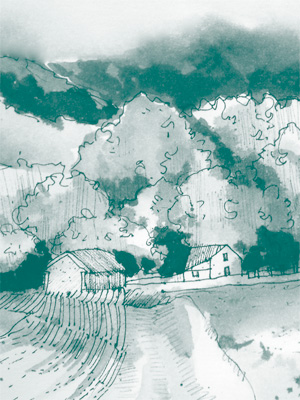
|
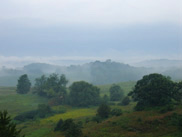
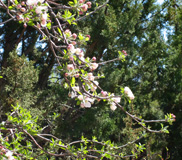
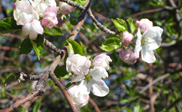
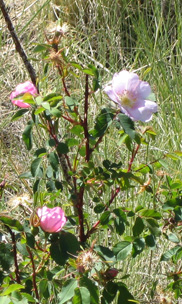
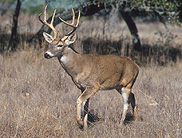
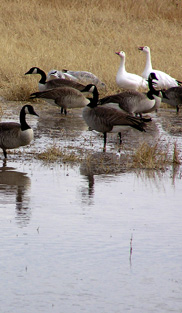
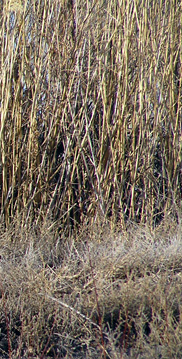
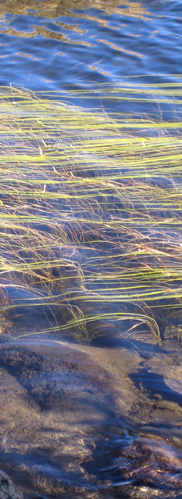
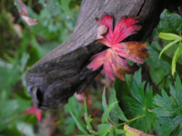
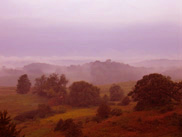
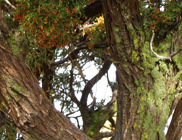

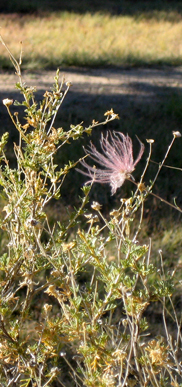

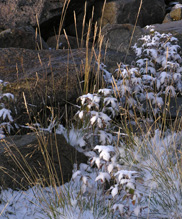
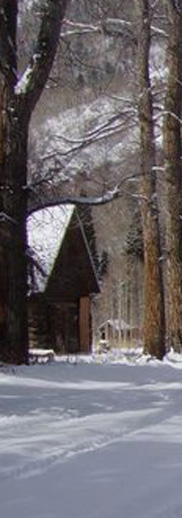
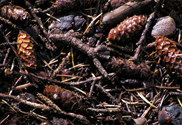

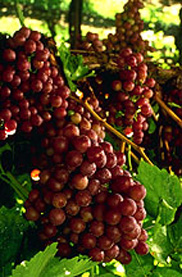
We are deeply saddened by the news that poet Patricia Monaghan has passed away. Voices from the American Land published Patricia's chapbook GRACE OF ANCIENT LAND in January 2011. Godspeed, Patricia. Our love and respect are with you.
THINGS TO BELIEVE IN
trees, in general; oaks, especially;
burr oaks that survive fire, in particular;
and the generosity of applesseeds, all of them: carrots like dust,
winged maple, doubled beet, peach kernel;
the inevitability of changefrogsong in spring; cattle
lowing on the farm across the hill;
the melodies of sad old songscomfort of savory soup;
sweet iced fruit; the aroma of yeast;
a friend’s voice; hard workseasons; bedrock; lilacs;
moonshadows under the ash grove;
something breaking through—Patricia Monaghan
Tony Hunt read Pat's poem, Ways to Leave, recently in Albuquerque, as a tribute to her unique voice. Here is a link to the reading.
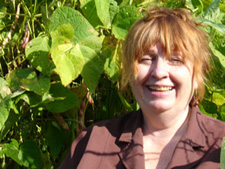
Patricia Monaghan tends vines, trees and vegetables near Black Earth, Wisconsin, as well as teaching environmental issues and literature at DePaul University in Chicago. She is the author of four books of poetry, most recently Homefront, on the impact of war on families, and many works of nonfiction including The Red-Haired Girl from the Bog: The Landscape of Celtic Myth and Spirit. Among her literary awards have been a Pushcart Prize and the Phoenix Award for environmental poetry. In Grace of Ancient Land award winning poet, playwright and essayist Patricia Monaghan writes of and from the Driftless area of Southeastern Wisconsin. The poems reveal the unique typography of stream-cut valleys and limestone-crowned hills that rolls out in a 600 mile swath of forest, farm and field. Patricia Monaghan opens to us the heart of this virtually unknown magical geography. Across wilding orchards, to a blaze of prairie grasses/pink and scarlet in the dying sun., the poet’s attention is precise, awed, unsentimental. Within these arcs Patricia watches light fall across the meadow pearling the hissing woodlands, the dust-blue grapes ripe amongthe sunset plums was grace itself . . . the embrace of . . . the unsought present. Her work falls in the tradition of Aldo Leopold’s “land ethic.” Yet it is a subversive moral vision in the tradition of Eavan Boland’s ethic of “powerful ordinariness.” Monaghan thus genders her land ethic. Monaghan does not mythologize the land but embodies its beauty and bounty in the luminous ordinary of planting, canning, the fleeting presence of deer and hawk. She implicitly links seasonal change to the cycle of birth and death. When she sees the hawk circling for field mice, she reminds us of the mortal path we trod and bids us to pay attention to what grace offers: the quickening unbidden moment. —Renny Golden
Grace of Ancient Land —Introduction by Renny Golden The sacred, for Patricia Monaghan, is revealed in southwestern Wisconsin’s meadows and slow breathing rivers, trees and bees, hawks and field mice, the rolling hills and
She listens carefully to the chorus of wind, river, rustling fields chanting: everything lives, everything lives. Patricia’s poems reflect both the music and silences of an ancient land. Her attentiveness calls the reader to wake up to the world’s beauty and to its deep witness. Monaghan’s work is a meditation in the tradition of Annie Dillard who, too, invites us to awakening: “we live in time’s hurdy-gurdy; we wake, if we ever wake, to the silence of God.” “If we ever wake” . . . Monaghan offers the abundance: dust-blue grapes ripe among/ sunset plums; the winding paths that deer cut on the prairie; sumac flames; the geese cry out; aster blooms, the apples fall. She evokes Walt Whitman’s praise songs, and, too, conservationist poet-priests Wendell Berry and Thomas Berry. Like Thomas Berry, she finds grace in wildness. “Wildness,” says Berry, “is the root of the authentic spontaneities of any being.” In “Grace and Wildness” Monaghan sees a tangle of wild plums . . . vines twisting up the slender trees . . . the embraceof splendid momentary life, the unsought present.The gift of the unsought present continually surprises her:
This is a poet of unsentimental awe, awakened and enchanted by the mystery of world and spirit revealed in the wild ordinary. Like Wendell Berry, she seeks solace in wildness. When in despair for the world, Berry lies down where the wood drake/rests in his beauty on the water, / and the great heron feeds. / I come into the peace of wild things. Patricia and her husband Michael McDermott’s farm in the Wisconsin Driftless Area is a refuge, the place of wild things. To match the holiness she finds there, she uses a liturgical scaffold. The book’s structure follows the Mass of Patricia’s Irish Catholic youth. She discovers in the season’s turning a liturgy that celebrates the sacraments of time and world. “Getting to Black Earth” is the Introit of the mass intoning the beginning of the Driftless region, a half-million years before when the glaciers of four Ice Ages detoured around southwestern Wisconsin. “Confiteor: A Country Song” confesses our sins against each other and the ravished land. In the poem Monaghan senses the past presence of another who loved the land before.
“Things to Believe In” is Monaghan’s Credo. It is a Credo without orthodoxy. She believes in this world; immanent, ever changing:
“The Oracle of Nine Trees” is a gospel of trees in their bearing; their anchored presence assuring us. But the oracle refuses only comfort, announces the inevitable. The mortality of trees, like ours, is provisional, glorious, lonely and doomed. “Transubstantiation” is eucharist. Who does not recognize this day?
It is the time just before harvest when all is burnished gold- rose, vineyards, and orchards surrendering. Just before turning toward chill, the fields offer up themselves: take and eat from this land. All is transformed: apples and tomatoes, carrots and grapes torn from vines and soil to feed us. This is the grace we take for granted: what is broken to nuture us. Everything lives, everything dies. Still, the poet rejoices. We cannot outrun our mortal fate, nor save the creatures of fang and wing. Wendell Berry suggests imitation:
Monaghan practices resurrection. She sees death not as defeat but surrender. In “Harvest Evening” she does not wince.
In “Ways to Leave” the last blessing of the liturgy (ite missa est go, the mass is ended) she invites us to
This leave-taking is the dark in the fields gone brown and grey, summer’s end. Monaghan looks to the natural world to open the doors of our lonely finitude. Her work is an Alleluia for the Driftless, a unique Midwestern land. American land, however, is not her only influence. She has dual citizenship in Ireland and the United States. In Ireland Patricia went searching not just her relative line but toward Yeats’ “terrible beauty”, its spirit, magic and tragedy. Pagan Ireland and her pastoral Goddesses who blessed harvests and bog side persuaded Patricia that nature had spirit, a consciousness the ancients knew. Irish poets like Seamus Heaney and Eavan Boland echo in her poems: Heaney’s language is lyrical, a precise rendering of the cyclical seasons shaping his youth on a farm, as well as, wry and tender in describing his own approaching leave-taking. Yet it is Eavan Boland whose influence is most subtly present in Monaghan’s work. Boland reclaimed the ordinary — of women’s lives — from the dustbin of irrelevance where Irish women’s utterances were tossed. In her poem “Celebration of the Ordinary” Monaghan helps us see the familiar’s stunning reciprocity
Boland too sees in a fleeting moment: vastness, beauty. She finds in the leave-taking of the day, the hour of change, metamorphosis, an ordinary reminder that we stand on spinning ground, flung round with trees and rivers that inhabit the wild top that holds us.
In celebrating the ordinary, Monaghan awakens our love for what is, in order to save it. She does not argue for this love, she presents its fragile, daily perseverance in poem after poem. But her choice of language and subject is an ethical one. Eavan Boland examines the urgency of such choice: "Who the poet is, what he or she nominates as a proper theme for poetry, what selves poets discover and confirm through this subject matter — all of this involves an ethical choice. The more volatile the material — and a wounded history, public or private, is always volatile — the more intensely ethical the choice." Monaghan’s lyrical language, precisely rendering the lush bounty of harvest, lures us to commemorate the wild, the marred, ancient marvel of the Driftless. She both breaks silences and invites them. In the end she reminds us that there are many ways to leave, as winter is upon us.
Everything dies, everything rises. Monaghan practices ordinary resurrections. Ite misa est. Go, this mass ends. Renny Golden’s book of poetry, The Hour of the Furnaces, was nominated for a National Book Award; her new book of poetry, Blood Desert: Witnesses 1820–1880 (Nuevo Mexico in the 1800s), was published in 2011 by the University of New Mexico Press. Poems by Patricia Monaghan:
|
||







